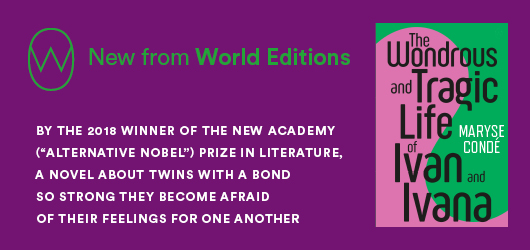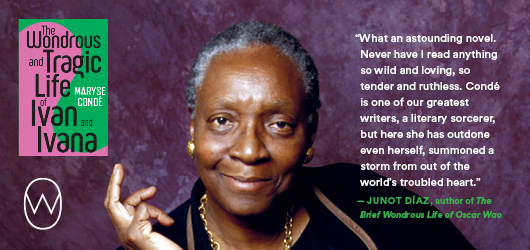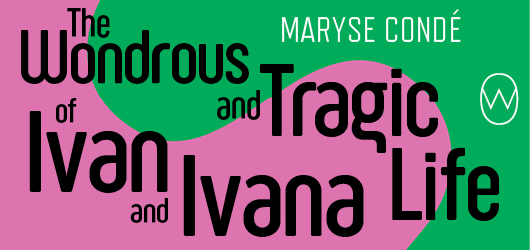A CONVERSATION ABOUT THE LINGERING EFFECTS OF COLONIALISM WITH MARYSE CONDÉ, AUTHOR OF THE WONDROUS AND TRAGIC LIFE OF IVAN AND IVANA
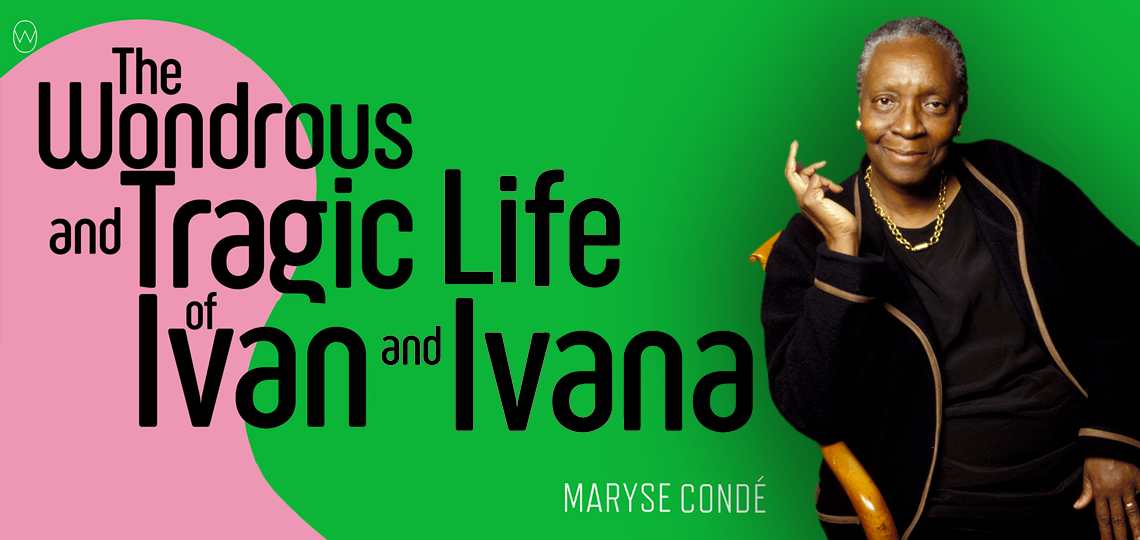
In our fascinating, complicated world made up of innumerable moving, dueling, and complementary parts, it can sometimes be tempting to narrow our focus to single, black-and-white elements for our own peace of mind—to enforce positivity on the one hand, or to wallow in cynicism on the other. Preferencing simplicity gives us the illusion of having attained understanding.
But for great novelists, there are no such easy answers: considering any dichotomy, novelists find the between spaces to be more fertile, particularly the places where contradictions meet and life happens. This is nowhere more apparent than in Maryse Condé’s novel The Wondrous and Tragic Life of Ivan and Ivana, about twins who are both at odds, and in love, with one another. Born on an island whose outward beauty belies its dark colonial history, Ivan and Ivana fight against forces within and without, hoping to arrive someplace safe, or at least on sure footing. What they don’t know, and what great novelists—like Maryse Condé, winner of the New Academy Prize in Literature—do know, is that little is that simple. One of Condé’s twins fades, nice and neat, into the circumstances that surround her; the other becomes a terrorist. Their fates remain intertwined.
We were held in thrall by this bold, violent, piercing, and often lovely novel, which, in the May/June issue of Foreword Reviews, reviewer Monica Carter called “a searing literary portrait of the exploitation of immigrants, the corruption of governments, and the powerful emergence of radicalism, with astute commentary on how these elements breed trauma, generation after generation.” As such, we jumped at the opportunity to interview Condé and learn more about what inspired her book, and what directed its singular turns. Her answers to our questions did not disappoint.
Ivan and Ivana are twins and have a kind of yin/yang relationship—a dichotomy of passions. She is gentle, and he is tempestuous; she wants to fit in, and he is convinced that he never will. Still, they are inseparable, which, as a lawyer posits late in the book, leads to the circumstances of their deaths. Why did you choose twins as the vehicle for your story about globalization, anger, and desire?
Ivan and Ivana are not merely characters out of a novel, a brother and sister seeking to hide an incestuous love. They are also the theoretical representation of two types of behavior with regard to colonization. When I was young and my generation discovered colonialism, our reaction was to reject it outright and look for the pre-colonial authenticity of our ancestors. Consequently, Antilleans turned to Africa, the lost land of their ancestors. Such an endeavor, however, was extremely complicated since colonialism had left a legacy which had some positive aspects: such as classical music, literature, and painting. We were therefore living in perpetual confusion and contradiction. Today things are very different. Many of the children of colonized peoples are born in Europe where poverty forced their parents to come and settle. This new generation considers France, Belgium, and the UK as their homeland and believe themselves entitled to live freely as European citizens. Ivan and Ivana represent these two notions of acceptance and rebellion: Ivan is a rebel who rejects Western values, Ivana accepts them and aims to become assimilated.
You capture other seeming contradictions well, too: the beauty of Guadeloupe’s coast alongside the hardships that its people experience; Lansana’s devotion to music alongside the religious fervor that surrounds him. How do these disparate parts inform each other in your novel and beyond?
During the time of slavery, travelers to the Caribbean were not interested in the poverty and suffering of the African slaves, but by the beauty of the landscape. As a result, the Caribbean became known as a sort of earthly paradise. This myth is still very much alive today and the dichotomy exists in my novel. Guadeloupe, for example, is riddled with poverty, unemployment, and violence. In the French press, however, the Caribbean is a place for vacationing and cheap holidays.
Though they feel that they rarely disagree, Ivan and Ivana have very different reactions to discovering that they’re disadvantaged: Ivan becomes sullen, while Ivana determines that “to be happy on this earth we need to shut our eyes to a good many things.” Arguably, Ivan’s reaction is the first step toward the tragedies that come later. Do you think that Ivana might actually have achieved such “happiness” without Ivan’s influence—and why or why not?
Yes, I think that Ivana does not understand her brother’s rebelliousness. Ivana is perfectly assimilated and prepared to turn her back on the past and its suffering. I myself have always rejected assimilation and am closer to Ivan.
Ivan’s pulls toward radicalization are always tinged with ambivalence. How much of the violence that surrounds him is a matter of conviction, and how much of it is a matter of circumstance—both his circumstances, and those of the cultures and places that he finds himself in?
The term “radicalization” is bandied about a lot these days, but nobody seems to know exactly what it means. It is commonly believed that it’s the point where the individual decides to act for incomprehensible reasons. Ivan is a loser. He is hopeless at school and is sentenced to prison without ever understanding why. Consequently, he is convinced that the world around him is hostile without grasping the reason why. His attitude is the result of him not understanding or analyzing his situation. He believes he is a victim but does not know of what. As a result, the massacre in which he is involved and dies has no ideological meaning for him.
In Mali, it is hard not to read the introduction “Call me Ismaël” as a literary allusion. Did you intend it as such, and if so, to evoke what?
A book is not merely intended for the reader; the author likes to have fun, as well. I love the phrase which starts off Moby Dick and included it for my own pleasure.
Your lines make an effort to draw the audience in to Ivan and Ivana’s story, which, though intimate, also nods to a greater “we.” Why did you take this approach?
I always aim for a mix of the intimate and the universal. The author tells a story based on her personal memories and dreams. She hopes, at the same time, it will reach out to a larger audience, even crossing borders, and achieve the universal. If there is one thing an author loves to hear it’s when a reader says it’s my story you have written here. When I first heard this as a young writer, I was deeply shocked but later I realized it was one of the greatest compliments I could receive.
THE WONDROUS AND TRAGIC LIFE OF IVAN AND IVANA
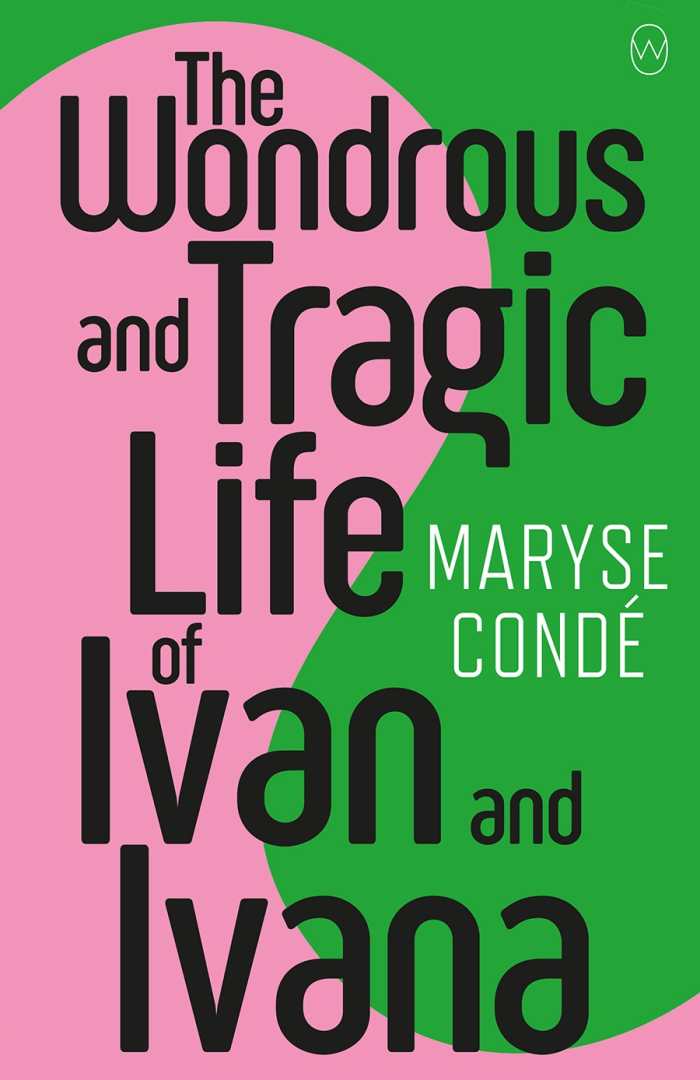
Maryse Condé
Richard Philcox, translator
World Editions
Softcover $16.99 (368pp)
978-1-64286-069-6
Buy: Local Bookstore (IndieBound), Local Bookstore (Bookshop), Amazon
Maryse Condé’s The Wondrous and Tragic Life of Ivan and Ivana is a gripping story in which a twin brother and sister grow up in the turbulent atmosphere of Guadeloupe. Exploring extremism, corruption, desire, immigration, poverty, and exploitation through the twins’ stories, which are more and more divergent from one another’s, the book reveals that pain affects each person in a different way.
The twins’ parents are Simone, a sugarcane worker, and Lansana, a musician. After their brief affair, Lansana leaves to chase a musical career, and Simone cares for Ivan and Ivana alone. Ivan is strong-willed with little interest in school, and Ivana has a beautiful voice and loves learning. As Ivan grows, he experiences humiliations and arrests; he is influenced by criminal adventures and the teachings of Islam. The intense bond and desire between Ivan and Ivana is too difficult for either of them to break, even as they move from Guadeloupe to Mali to Paris in search of economic opportunities and education.
Rich atmospheres are established in each locale. Gritty, dank surroundings are contrasted with the clothes, neighborhoods, and homes of the well-off. This contrast proves to be a catalyst in Ivan’s us-versus-them mindset; for Ivana, it becomes motivation to provide for her mother. The narrator sometimes interjects themselves into the story to warn against accepting things at face value.
The Wondrous and Tragic Life of Ivan and Ivana is a searing literary portrait of the exploitation of immigrants, the corruption of governments, and the powerful emergence of radicalism, with astute commentary on how these elements breed trauma, generation after generation.
MONICA CARTER (April 27, 2020)
May 22, 2020
Michelle Anne Schingler

